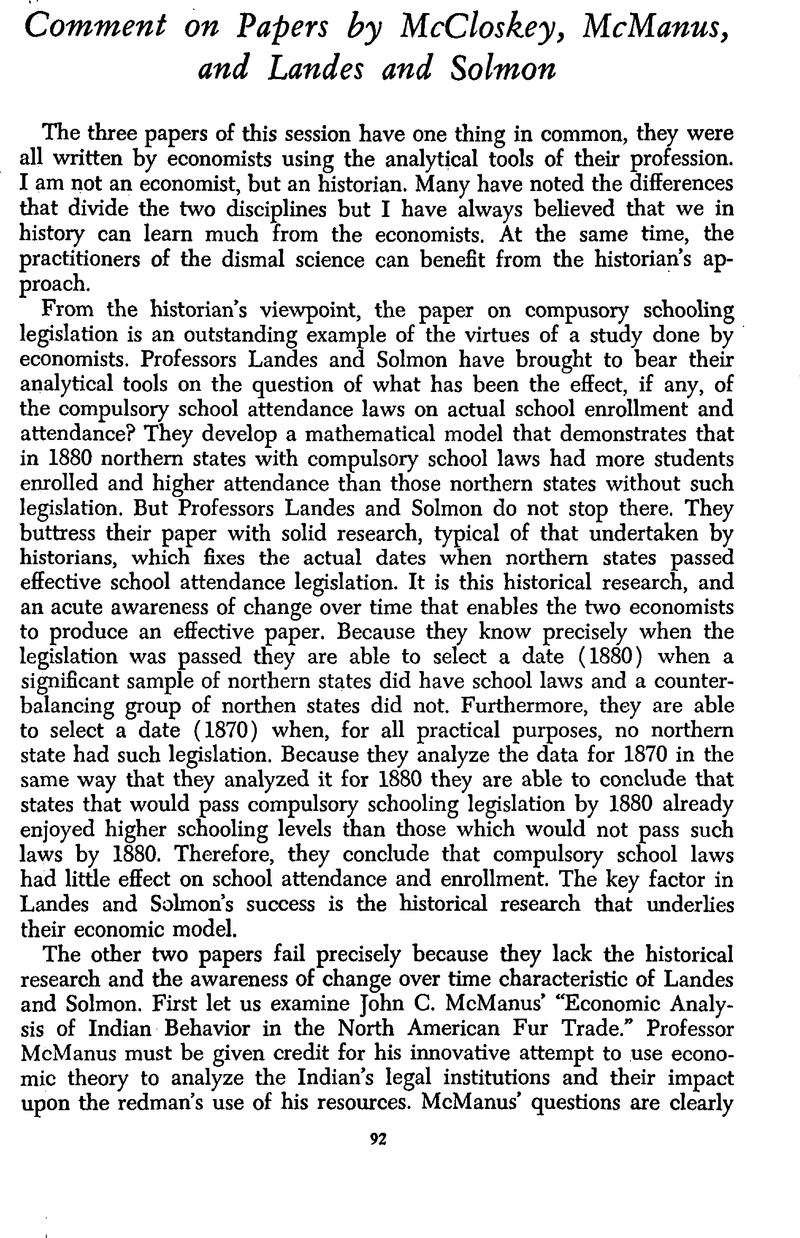No CrossRef data available.
Article contents
Comment on Papers by McCloskey, McManus, and Landes and Solmon
Published online by Cambridge University Press: 11 May 2010
Abstract

- Type
- Papers Presented at the Thirty-first Annual Meeting of the Economic History Association
- Information
- Copyright
- Copyright © The Economic History Association 1972
References
1 See De Vany, Arthur S., Eckert, Ross D., Meyers, Charles J., O'Hare, Donald J., and Scott, Richard C., “A Property System for Market Allocation of the Electromagnetic Spectrum: A Legal-Economic-Engineering Study,” in Water Resource Management (Meyers and Tarlock, ed., 1971), p. 49.Google Scholar
2 Others equally could have been chosen; Allen, Durward Leon, Our Wildlife Legacy (New York: Funk and Wagnalls, 1954), c. 1.Google Scholar
3 Max Nicholson believes the hunting run goes back to 5000 B.C.; Nicholson, Max, The Environmental Revolution (New York: McGraw-Hill, 1970), pp. 136–37.Google Scholar
4 Father Thomas Davitt denies the existence of the problem in a way suited to the instant paper; Davitt, Father Thomas, The Elements of Law (Boston: Little, Brown and Co., 1959), pp. 246–47.Google Scholar
5 For the contemporary New England view of the state's educational duty, see Woolsey, Theodore Dwight, Political Science or The State Theoretically and Practically Considered (2d Edition; New York: C. Scribner's and Sons, 1878), p. 405.Google Scholar
6 Thus, Paul Goodman, who now opposes compulsory schooling, would have favored it in the nineteenth century; Goodman, Paul, Growing Up Absurd (New York: Random House, 1960), p. 224.Google Scholar
7 For example, J. Willard Hurst sees compulsory free public school laws as part of the tendency “to give the school more and more responsibility for keeping children out of trouble and policing what they did,” Hurst, James Willard, The Growth of American Law (Boston: Little, Brown and Co., 1950), p. 15.Google Scholar
8 Knappen, Marshall Mason, Constitutional and Legal History of England (New York: Harcourt, Brace and Co., 1942), pp. 249–50.Google Scholar
9 Max Weber and other Continental writers insist the contrary occurred; Weber, Max, General Economic History, Knight, Frank, ed. (New York: Crowell-Collier Publishing Co., 1961), p. 77.Google Scholar
10 Also, his estimate on the high cost of private Parliamentary bills is confirmed for the early Victorian period; Lolme, Jean Louis De, The Constitution of England, MacGregor, John, ed. (London: H. C. Bohn, 1853), Suppl. III, No. 1, at p. 344.Google Scholar
11 The importance in Marxist and other radical historical writing of what “collective property” means is stressed in Stoyanovich, K., Marxism et Droit (Paris: Librairie Générale de Droit et de Jurisprudence, 1964), p. 48.Google Scholar


